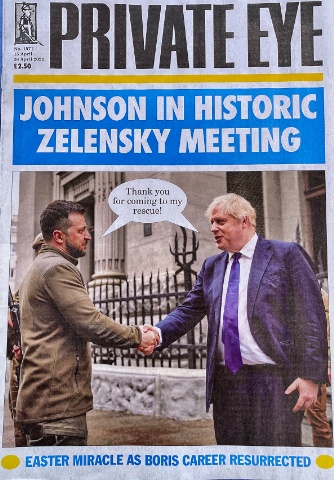Tulip mania

In the College garden on Saturday afternoon.
Johnson and the War

As far as I can discover, Boris Johnson is the first serving Prime Minister to be convicted of a crime while in office. If Putin had not invaded Ukraine and thereby enabled Johnson to posture as a Churchill tribute act, Tory MPs would be working out to defenestrate him. One of the arguments being tried for doing nothing about the ‘Partygate’ scandal is that it would be madness to change a Prime Minister in the middle of a war. Clearly none of the proponents of this line have read any history. Neville Chamberlain was the serving Prime Minister when Britain was actually in an existentially-threatening war, but he resigned on 10 May 1940 to make way for Winston Churchill.
Quote of the Day
”Necessity is the plea for every infringement of human freedom. It is the argument of tyrants; it is the creed of slaves.”
- William Pitt, 1783
Musical alternative to the morning’s radio news
Brahms | Intermezzo A Major Op 118 No 2 | Radu Lupu
Long Read of the Day
Gary Gerstle on the strange life — and possible death — of neoliberalism
Gary has a new book out – The Rise and Fall of the Neoliberal Order — which is now on my reading list. Here is a transcript of a fascinating conversation between him and Daniel Steinmetz-Jenkins of The Nation. I was particularly struck by Gerstle’s observations on Obama:
What was it about Obama that compelled him to save rather than to resist the neoliberal political order, especially given what happened after his presidency?
GG: The election of Barack Obama in 2008 unleashed all kinds of hopes for the country’s future. Fourteen years later, we have the advantage of historical perspective. That perspective tells us (or me, in any case), that Obama is best seen as the last president of the neoliberal order, not the first president of a post-racial, progressive age.
To handle the economic crisis, Obama turned to a team of advisors, including Timothy Geithner, Lawrence Summers, Peter Orszag, and Michael Froman, quite similar in policy orientation to the Rubin team that had overseen the Democratic Party’s assent to the neoliberal order in the 1990s. They decided not to punish the large banks whose misdeeds had brought on the crisis but to focus instead on restoring them to financial health and security as quickly as possible. Thus, no banks were nationalized or broken up, and no bankers were sent to jail for their misdeeds. There was not even a public shaming that would have occurred had banking executives been forced to run the gauntlet of congressional hearings.
Meanwhile, millions of Americans were losing their jobs and their homes. The gap between rich and poor widened during Obama’s first term, with the income of the top 1 percent of American income earners increasing by more than 30 percent while the bottom 99 percent had to settle for a raise too small to matter. Main Street Americans noticed that elites had been restored to financial health and security while they had not.
By temperament, Obama was a cautious man. Moreover, the burden of restoring to health a shattered global financial system was immense. But the more important point to make here is a different one: namely, that the neoliberal order was still hegemonic, constraining Obama’s sense of the choices available to him…
He’s also good on Joe Biden.
Do read the whole thing.
Peter Thiel: the cut-price Cicero
Yesterday’s Observer column:
Since powdered rhino horn has (rightly) been banned, only two aphrodisiacs remain: political power and great wealth. Of these, the second is the more interesting, partly because most humans, especially journalists, seem to be affected by it. It’s what leads them to assume that if someone is fabulously rich, then she or he must be very smart. That’s why the super-rich are invariably surrounded by fawning sycophants – and also why they eventually come to believe that they themselves are geniuses.
Which brings us neatly to Peter Thiel, Silicon Valley’s leading contrarian. With a net worth of perhaps $5bn (£3.9bn), he is undoubtedly rich, though not in the Elon Musk, Jeff Bezos or even Bill Gates league. But since he is the only public intellectual that the tech industry has produced, there is a widespread belief that he must also be a deep thinker, which is why organisations ask him to give “keynote” speeches.
The function of such addresses is to give an elevated tone to what are otherwise sordid proceedings, which explains why Thiel was invited to address the 2022 bitcoin conference in Miami, which was billed as “a four-day pilgrimage for those seeking greater freedom and individual sovereignty”. Given that the attendees at this shindig were likely subscribers to the view that he is a genius, it was an easy gig for the great man. Think of it as Narendra Modi addressing the annual conference of the Bharatiya Janata party and you’ll get the general idea.
Thiel was there to tell the attendees that they were the Lord’s anointed…
Kevin Roose’s Latecomers Guide to Crypto: the annotated version
You may remember that Roose’s NYT piece was Friday’s ‘Long Read’. Some experts were not impressed by it, and Molly White has produced a lovely critically-annotated version which provides an antidote to what critics saw as “a thinly-veiled advertisement for cryptocurrency”.
Thanks to Bill Janeway (Whom God Preserve) for alerting me to it.
My commonplace booklet
Mumurations of starlings. Extraordinary photographs. Link
This Blog is also available as a daily email. If you think that might suit you better, why not subscribe? One email a day, Monday through Friday, delivered to your inbox. It’s free, and you can always unsubscribe if you conclude your inbox is full enough already!
